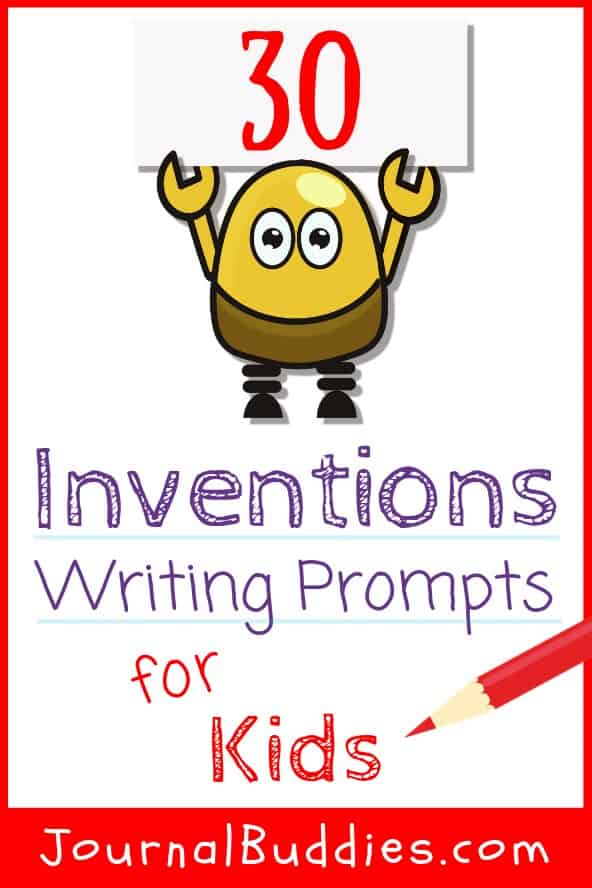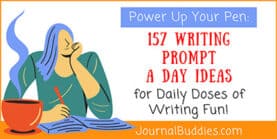Writing about Inventions prompt ideas for Kids and Students— Use these writing prompts and topics to help your students learn all about inventors and inventions—and to inspire them to begin developing their own creative skills!

Fun and Innovative Assignment
From Thomas Edison to Eli Whitney, and from Alexander Graham Bell to Steve Jobs, history’s most storied inventors truly leave indelible marks on our world.
And as a teacher, you help students learn about these greats—both so that they may understand the historical significance of prominent inventors and so that they might be inspired and emboldened to follow their own pursuits.
In these, dare we say “innovative” journal prompts, your entire class will consider inventors, their creations, and the impact that new works leave upon the world.
As your writers reflect on the qualities that inventors must have to succeed and consider the ways in which inventions inspire additional creations and iterations, students will begin to understand what it takes to build something new—and how a single creation can transcend into something bigger than itself.
Now…
Have the students in your classroom explore the following questions. Then have them pick up their pen or pencil and innovate the beginning of the writing process in their own words. (We suggest drafting without concern for grammar or spelling or even complete sentences to ensure the highest level of innovations in your students).
30 Inventions Writing Prompts
Enjoy this wonderful list of inventions writing ideas and writing about inventions prompts for students.
- If you could invent one thing that would make your life easier, what would you create? Why?
- What do you think is the greatest invention the world has ever seen? Why?
- What skills does it take to be an inventor? Which of these skills do you have?
- How could you practice some of the other skills that inventors have?
- Would you rather come up with an idea for a new invention, or be the person who builds the new invention? Why?
- Do you consider yourself to be an idea person? Why or why not?
- Are you better with big picture ideas or looking at small details? Why are both of these skills an important aspect of inventing?
- Choose a famous inventor from history and discuss his or her impact on the world.
- Think of something you use every day that someone once invented. How would your life be different if this invention didn’t exist?
- Is it possible to create a totally new invention that is unlike anything the world has ever seen, or are all inventions iterations of old ideas? Why?
- Write about a time when you invented something—whether it was a tool, a story, a philosophy, or something else. Discuss where you came up with the idea and how you put your idea into practice.
- Is inventing the act of coming up with the idea or the act of building something new? Explain why.
- What does it mean when someone says that something is “the greatest invention since sliced bread”? Why do people say this?
- If you had to invent something that would make your schoolwork easier, what would you invent? Why?
- If you had to invent something that would make your chores easier, what would you invent? Why?
- List five historic inventions. Then, choose one and write about the impact it made on society as a whole.
- List five historic inventions. Then, choose one and write about some of the other inventions that it inspired.
- List five historic inventions. Then, choose one and write about how history would have changed if the invention had not been invented.
- If you could meet any famous inventor, whom would you choose? Why? What questions would you ask him or her?
- Why is it important for people to invent new things?
- What does it mean to be an inventor? Define the word and then describe what makes a person an inventor.
- Think of something you could invent. Then, describe how you would go about doing so. Explain how you would research your idea, how you would build it, how you would test the invention, etc.

- Choose a famous invention from history and write about the processes that the inventor likely went through between the time when he or she came up with the idea and the time when the invention was finished.
- Why do we study inventors? What can we learn from them?
- What would the coolest part of inventing something be? Why?
- Think about the process of inventing something and all the steps that go into it. Which part do you think would be the easiest? Why?
- Think about the process of inventing something and all the steps that go into it. Which part do you think would be the hardest? Why?
- Imagine you are an inventor who likes to work on many projects at one time. What kinds of things would you keep in your lab? Be as detailed (and creative!) as possible.
- Write a short story about an inventor who creates something that turns out a little differently than he or she planned.
- List five common household objects. Then, write about how you could combine two or more of them to create a brand new invention.
A Few Closing Words
The technology of invention is ever-changing – the process today’s inventors may use will vary differently from their grandparents but the creativity and inspiration remains the same! Students of any grade can use and enjoy these writing ideas. Whether they compose a well-thought-out and organized thesis or simply free-write, the point is for them to enjoy the process of discovery, innovation, and writing.
For further inspiration check out these invention inspirational resources:
- 10 Kid Inventors Who Changed Our Lives
- 20 Women Inventors You Should Know
- 8 World-Changing Black Inventors That Every Kid Should Know About
Ok, that’s all for today.
Until next time, write on…
If you enjoyed these Writing about inventions and Inventions Writing Prompts for Students,
please share them on Facebook, Twitter, and/or Pinterest.
I appreciate it!
Sincerely,
Jill
journalbuddies.com
creator and curator






